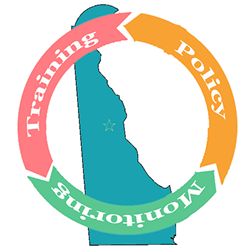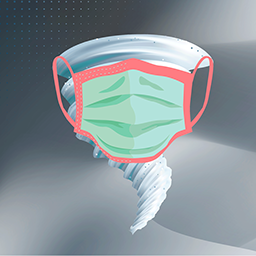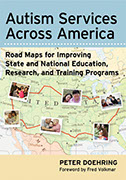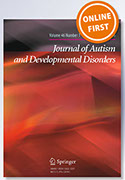Train & Hope??
![]() Training is necessary but often insufficient to ensure adoption of new practices.
Training is necessary but often insufficient to ensure adoption of new practices.
White elephant
![]() Create effective, sustainable programs before sinking money into a new building.
Create effective, sustainable programs before sinking money into a new building.
Implement, baby, implement
![]() Is traditional autism research becoming a bridge to nowhere?
Is traditional autism research becoming a bridge to nowhere?
Research to guide services
AutismSpectrumNewsNot all research is equally relevant to those focused on providing services.
A Network on Excellence
 Can statewide training increase expertise and capacity, and bridge gaps?
Can statewide training increase expertise and capacity, and bridge gaps?
A Bus to Betsy's
 The nominee to lead special education in the US could send it back to the Stone Age.
The nominee to lead special education in the US could send it back to the Stone Age.
The Business of innovation
 New services are shaped not by research but by available funds, staff, and expertise.
New services are shaped not by research but by available funds, staff, and expertise.
Margot votes! Will others?
 Learn how people like Margot exercise their right to vote in the 11 states that allow it .
Learn how people like Margot exercise their right to vote in the 11 states that allow it .
CoVid's silver lining
 Insights into the isolation and costs of disability might finally spur policy changes.
Insights into the isolation and costs of disability might finally spur policy changes.
A State of Synchro
The magic of teaching someone like Margot to ski mobilizes a remarkable army.
A Drop in the Bucket
New data suggests ASD research has little impact on improving identification.
A Bus to Betsy's
Why the nomination of Betsy DeVos as Secretary of Education risks sending special education back to the Stone Age
January 27, 2017
 Despite this tumultuous political season, I have always felt our most important institutions and values will survive. That is, until I heard Betsy DeVos, our President’s pick for Secretary of Education. I fear that the right of children with disabilities to a free and appropriate public education with their non-disabled peers will be under attack. Betsy DeVos' ignorance surrounding special education, her drive to decrease federal oversight, and her desire to turn funding and power back to the states, would send us back to the Stone Age.
Despite this tumultuous political season, I have always felt our most important institutions and values will survive. That is, until I heard Betsy DeVos, our President’s pick for Secretary of Education. I fear that the right of children with disabilities to a free and appropriate public education with their non-disabled peers will be under attack. Betsy DeVos' ignorance surrounding special education, her drive to decrease federal oversight, and her desire to turn funding and power back to the states, would send us back to the Stone Age.
Every Democrat and every Republican with a child receiving special education should be scared of Betsy DeVos. I am terrified for my 16 year-old daughter Margot. She has multiple and complex developmental disabilities that have required special care almost every minute of every day for her whole life, and will continue to require care until she dies. Though our lives have been difficult, I cannot imagine how we would have ever survived without the protections put in place more than 30 years ago through what has been known as the Individual with Disabilities Education Act or IDEA. Every educator in the US knows this is federal law, except the woman tapped to lead them.
How quickly we can forget the battles fought for changes once considered revolutionary? Before IDEA and other related laws, people with disabilities were treated like cattle. In those times, the most progressive treatment that John F. Kennedy’s eldest sister Rosemary could get was a lobotomy. Even one of America’s most powerful families was not immune to the stigma of disability; her own mother did not visit Rosemary for more than 20 after she was institutionalized following her lobotomy. IDEA was part of a revolution that changed that, and began to give people with disabilities the dignity they deserve. And federal enforcement of IDEA has been perhaps the biggest step any country has taken to return dignity and hope to people like my daughter Margot.
I know this not just as a parent and advocate but also as a professional. For 25 years, I have worked in schools, hospitals, and universities trying to turn science into practice into better outcomes for people with Autism Spectrum Disorder or ASD. When I led a statewide public school program specialized for children with ASD in Delaware, I saw how dedicated public servants, guided by emerging scientific findings, changed the lives of children with the most complex disabilities in the most profound ways, regardless of their race or income or ethnicity. This never would have happened without IDEA and related legislation that Betsy DeVos is unaware or, and the strong oversight of the department she would seek to dismantle.
Betsy DeVos, and others who share her views, wants to hand all power back to the states. But I think our history is clear; the most revolutionary changes have required national leadership. We never would made it to the moon, had we left it up to the states. Civil rights, such as they are, never would have come to pass, had we left it up to the states. And IDEA and related laws never would have passed had we left it to the states.
I hope our values are clear: the rights of people with disabilities do not vary from state to state. Sure, give states control over how they pay teachers, where they train teachers, how they build schools, and other important details that do vary meaningfully. But my daughter Margot and everyone like her has the same right to dignity, to opportunity, and to equal protection, no matter where they live. That is not up to each state to decide.
Our science is certainly clear. The needs of people with disabilities do not differ significantly from state to state. I have visited programs for children with ASD across the country and across the world, and it is oddly reassuring that the needs of these children are pretty much the same no matter where I go. And our science has become increasingly clear about what works: the evidence-based practices we have worked hard to identify are just as effective whether used in Delaware or in Pennsylvania or in Michigan.
And our record is very clear. In fact, our states, counties, and school districts already have a lot of say in the education of children with disabilities. This offers a natural experiment; where states have more control, are they more effective? Clearly, they are not. For example, we would expect that ASD occurs at about the same rate no matter where you live. But a study that Fred Volkmar of Yale University and I reviewed last year reveals that the number of children actually identified with - and receiving specialized help for - ASD varies tremendously from state to state. Why? Because each state can establish its own definition of ASD for use in the schools, even though researchers established ASD’s core features more than two decades ago. The result? Each year, tens of thousands of children with ASD are needlessly denied the specialized instruction they could have accessed had they been properly and promptly identified. And I have found that the education actually provided to these children varies even more widely, with profound and lifelong consequences.
Several years ago, I wrote the first book trying to document model programs of statewide services and training for people with ASD. I found that systems for providing education, health, community services, and employment varied wildly. In state after state, I have met dedicated advocates and professionals working hard to help their state do better. They all find the same problems and often propose solutions that have already proved unsuccessful elsewhere, while missing the model programs that do exist. So each state re-invents a square wheel, because we do not know what round looks like. Strong and smart federal leadership can fix that. Otherwise, each state acting on its own will waste our time, our dollars, and our children’s lives.
Though our state-by-state experiment in specific aspects of special education is revealing, our state-by-state experiment in delivering behavioral health is truly disastrous. I learned this when I helped to launch an inpatient treatment program for children with ASD in behavioral crisis that put their safety, or the safety of others, at immediate and significant risk. For many of these children, failed treatment leads to their placement in a specialized setting at a tremendous cost to society, and an incalculable cost to their quality of life. Many of these crises came about because easy opportunities to prevent them, using ideas and techniques identified through research, were simply missed. Why? Because each state has a patchwork of standards for preventative care, a slew of different service providers, and inadequate support and oversight at the state level, let alone the federal level.
And anyone with any experience in special education knows that the charter schools and private schools Betsy DeVos and others have so vigorously promoted are certainly no solution. Charter schools almost never step forward to offer a reasonably constructed program for anyone with more complex needs, and almost always adopt policies and practices that effectively bar these children from enrolling. We have private schools, and will always need some of them for children with the most complex needs. And IDEA provides ample means for parents to access these if a school is not up to the task, although it is only parents privileged through education or income who typically take advantage of these protections.
Allowing shareholders of a company to profit from my daughter’s disability, given the kind of oversight Betsy DeVos thinks is needed? Cattle would probably have better outcomes. On a related note, Betsy DeVos' reluctance to divest her $5 -$25 million stake in Neurocore is troubling. Neurocore promotes the use of neurofeedback as an effective treatment for autism and ADHD. Based on the information Neurocore provides on its website in support of these claims, my review- and that of others - raises important questions about the validity of these assertions.
But maybe I need to give Betsy a chance. Maybe I need to charter a couple of big yellow school buses, and bring children like Margot to her school district, or one of the charter schools she prefers. Just tell me where to go? Certainly Betsy can gather the experts and staff and facilities and funding to support my daughter and others, regardless of their numbers and their needs. I will start to pack, while I wait for an address. Unless, of course, the Senate Education Committee comes to its senses, and seeks a different a nominee who actually understands our laws, values, history, science, and record when it comes to special education in this country.
Related Content
On this site
Train & Hope??
![]() Training is necessary but often insufficient to ensure adoption of new practices.
Training is necessary but often insufficient to ensure adoption of new practices.
White elephant
![]() Create effective, sustainable programs before sinking money into a new building.
Create effective, sustainable programs before sinking money into a new building.
Implement, baby, implement
![]() Is traditional autism research becoming a bridge to nowhere?
Is traditional autism research becoming a bridge to nowhere?
Research to guide services
AutismSpectrumNewsNot all research is equally relevant to those focused on providing services.
A Network on Excellence
 Can statewide training increase expertise and capacity, and bridge gaps?
Can statewide training increase expertise and capacity, and bridge gaps?
A Bus to Betsy's
 The nominee to lead special education in the US could send it back to the Stone Age.
The nominee to lead special education in the US could send it back to the Stone Age.
The Business of innovation
 New services are shaped not by research but by available funds, staff, and expertise.
New services are shaped not by research but by available funds, staff, and expertise.
Margot votes! Will others?
 Learn how people like Margot exercise their right to vote in the 11 states that allow it .
Learn how people like Margot exercise their right to vote in the 11 states that allow it .
CoVid's silver lining
 Insights into the isolation and costs of disability might finally spur policy changes.
Insights into the isolation and costs of disability might finally spur policy changes.
A State of Synchro
The magic of teaching someone like Margot to ski mobilizes a remarkable army.
A Drop in the Bucket
New data suggests ASD research has little impact on improving identification.

